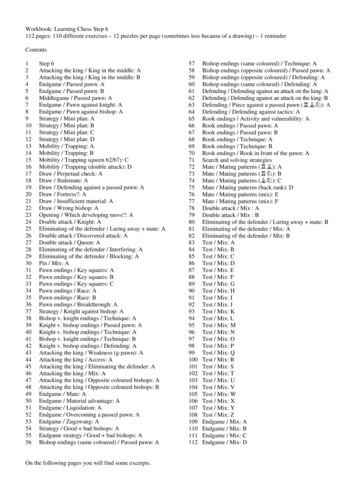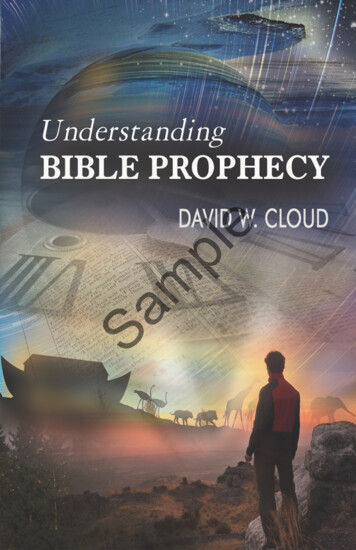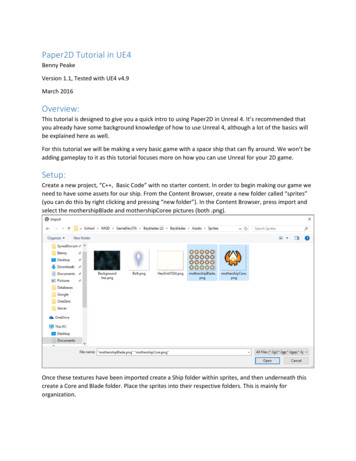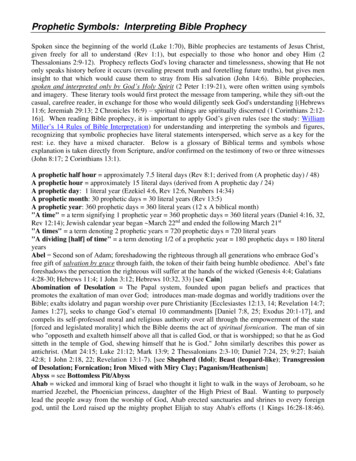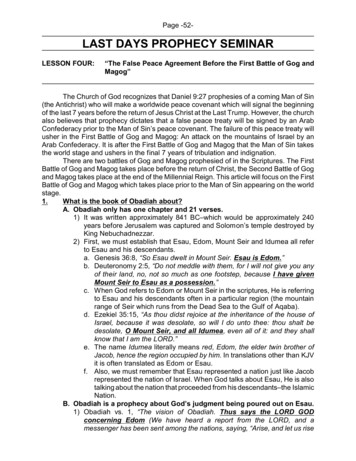
Transcription
Pawn of ProphecyBelgariad, #1by David Eddings, 1931-2009Published: 1982JJJJJIIIIITable of ContentsPrologue PART I Sendaria.Chapter 1 thru Chapter 11
PART II Cherek.Chapter 12 thru Chapter 21JJJJJIIIIIFor Theone,who told me stories but could not stay for mineand for Arthur,who showed me the way to become a manand who shows me still.PrologueBeing a History of the War of the Gods and the Acts of Belgarath the Sorcerer—adapted from The Book of AlornWHEN THE WORLD was new, the seven Gods dwelt in harmony, and the racesof man were as one people. Belar, youngest of the Gods, was beloved by theAlorns. He abode with them and cherished them, and they prospered in his care.The other Gods also gathered peoples about them, and each God cherished hisown people.But Belar's eldest brother, Aldur, was God over no people. He dwelt apart frommen and Gods, until the day that a vagrant child sought him out. Aldur acceptedthe child as his disciple and called him Belgarath. Belgarath learned the secret ofthe Will and the Word and became a sorcerer. In the years that followed, othersalso sought out the solitary God. They joined in brotherhood to learn at the feet ofAldur, and time did not touch them.Now it happened that Aldur took up a stone in the shape of a globe, no largerthan the heart of a child, and he turned the stone in his hand until it became aliving soul. The power of the living jewel, which men called the Orb of Aldur, wasvery great, and Aldur worked wonders with it.Of all the Gods, Torak was the most beautiful, and his people were theAngaraks. They burned sacrifices before him, calling him Lord of Lords, and Torakfound the smell of sacrifice and the words of adoration sweet. The day came,however, when he heard of the Orb of Aldur, and from that moment he knew nopeace.
Finally, in a dissembling guise, he went to Aldur. "My brother," he said, "it is notfitting that thou shouldst absent thyself from our company and counsel. Put asidethis jewel which hath seduced thy mind from our fellowship."Aldur looked into his brother's soul and rebuked him. "Why dost thou seeklordship and dominion, Torak? Is not Angarak enough for thee? Do not in thypride seek to possess the Orb, lest it slay thee."Great was Torak's shame at the words of Aldur, and he raised his hand andsmote his brother. Taking the jewel, he fled.The other Gods besought Torak to return the Orb, but he would not. Then theraces of man rose up and came against the hosts of Angarak and made war onthem. The wars of the Gods and of men raged across the land until, near the highplaces of Korim, Torak raised the Orb and forced its will to join with his to split theearth asunder. The mountains were cast down, and the sea came in. But Belarand Aldur joined their wills and set limits upon the sea. The races of man,however, were separated one from the others, and the Gods also.Now when Torak raised the living Orb against the earth, its mother, it awokeand began to glow with holy flame. The face of Torak was seared by the blue fire.In pain he cast down the mountains; in anguish he cracked open the earth; inagony he let in the sea. His left hand flared and burned to ashes, the flesh on theleft side of his face melted like wax, and his left eye boiled in its socket. With agreat cry, he cast himself into the sea to quench the burning, but his anguish waswithout end.When Torak rose from the water, his right side was still fair, but his left wasburned and scarred hideously by the fire of the Orb. In endless pain, he led hispeople away to the east, where they built a great city on the plains of Mallorea,which they called Cthol Mishrak, City of Night, for Torak hid his maiming indarkness. The Angaraks raised an iron tower for their God and placed the Orb inan iron cask in the topmost chamber. Often Torak stood before the cask, then fledweeping, lest his yearning to look on the Orb overpower him and he perish utterly.The centuries rolled past in the lands of the Angarak, and they came to calltheir maimed God Kal-Torak, both King and God.Belar had taken the Alorns to the north. Of all men, they were the most hardyand warlike, and Belar put eternal hatred for Angarak in their hearts. With cruelswords and axes they ranged the north, even to the fields of eternal ice, seeking away to their ancient enemies.Thus it was until the time when Cherek Bear-shoulders, greatest king of theAlorns, traveled to the Vale of Aldur to seek out Belgarath the Sorcerer. "The wayto the north is open," he said. "The signs and the auguries are propitious. Now isthe time ripe for us to discover the way to the City of Night and regain the Orbfrom One-eye."Poledra, wife of Belgarath, was great with child, and he was reluctant to leaveher. But Cherek prevailed. They stole away one night to join Cherek's sons, DrasBull-neck, Algar Fleet-foot, and Riva Iron-grip.Cruel winter gripped the northland, and the moors glittered beneath the starswith frost and steel-gray ice. To seek out their way, Belgarath cast anenchantment and took the shape of a great wolf. On silent feet, he slunk throughthe snow-floored forests where the trees cracked and shattered in the sundering
cold. Grim frost silvered the ruff and shoulders of the wolf, and ever after the hairand beard of Belgarath were silver.Through snow and mist they crossed into Mallorea and came at last to CtholMishrak. Finding a secret way into the city, Belgarath led them to the foot of theiron tower. Silently they climbed the rusted stairs which had known no step fortwenty centuries. Fearfully they passed through the chamber where Torak tossedin pain-haunted slumber, his maimed face hidden by a steel mask. Stealthily theycrept past the sleeping God in the smoldering darkness and came at last to thechamber where lay the iron cask in which rested the living Orb.Cherek motioned for Belgarath to take the Orb, but Belgarath refused. "I maynot touch it," he said, "lest it destroy me. Once it welcomed the touch of man orGod, but its will hardened when Torak raised it against its mother. It will not be soused again. It reads our souls. Only one without ill intent, who is pure enough totake it and convey it in peril of his life, with no thought of power or possession,may touch it now.""What man has no ill intent in the silence of his soul?" Cherek asked. But RivaIron-grip opened the cask and took up the Orb. Its fire shone through his fingers,but he was not burned."So be it, Cherek," Belgarath said. "Your youngest son is pure. It shall be hisdoom and the doom of all who follow him to bear the Orb and protect it." AndBelgarath sighed, knowing the burden he had placed upon Riva."Then his brothers and I will sustain him," Cherek said, "for so long as thisdoom is upon him."Riva muffled the Orb in his cloak and hid it beneath his tunic. They crept againthrough the chambers of the maimed God, down the rusted stairs, along the secretway to the gates of the city, and into the wasteland beyond.Soon after, Torak awoke and went as always into the Chamber of the Orb. Butthe cask stood open, and the Orb was gone. Horrible was the wrath of Kal-Torak.Taking his great sword, he went down from the iron tower and turned and smote itonce, and the tower fell. To the Angaraks he cried out in a voice of thunder."Because you are become indolent and unwatchful and have let a thief steal thatfor which I paid so dear, I will break your city and drive you forth. Angarak shallwander the earth until Cthrag Yaska, the burning stone, is returned to me." Thenhe cast down the City of Night in ruins and drove the hosts of Angarak into thewilderness. Cthol Mishrak was no more.Three leagues to the north, Belgarath heard the wailing from the city and knewthat Torak had awakened. "Now will he come after us," he said, "and only thepower of the Orb can save us. When the hosts are upon us, Iron-grip, take the Orband hold it so they may see it."The hosts of Angarak came, with Torak himself in the forefront, but Riva heldforth the Orb so that the maimed God and his hosts might behold it. The Orbknew its enemy. Its hatred flamed anew, and the sky became alight with its fury.Torak cried out and turned away. The front ranks of the Angarak hosts wereconsumed by fire, and the rest fled in terror.Thus Belgarath and his companions escaped from Mallorea and passed againthrough the marches of the north, bearing the Orb of Aldur once more into theKingdoms of the West.
Now the Gods, knowing all that had passed, held council, and Aldur advisedthem, "If we raise war again upon our brother Torak, our strife will destroy theworld. Thus we must absent ourselves from the world so that our brother may notfind us. No longer in flesh, but in spirit only may we remain to guide and protectour people. For the world's sake it must be so. In the day that we war again, theworld will be unmade."The Gods wept that they must depart. But Chaldan, Bull-God of the Arends,asked, "In our absence, shall not Torak have dominion?""Not so," Aldur replied. "So long as the Orb remains with the line of Riva Irongrip, Torak shall not prevail."So it was that the Gods departed, and only Torak remained. But the knowledgethat the Orb in the hand of Riva denied him dominion cankered his soul.Then Belgarath spoke with Cherek and his sons. "Here we must part, to guardthe Orb and to prepare against the coming of Torak. Let each turn aside as I haveinstructed and make preparations.""We will, Belgarath," vowed Cherek Bear-shoulders. "From this day, Aloria is nomore, but the Alorns will deny dominion to Torak as long as one Alorn remains."Belgarath raised his face. "Hear me, Torak One-eye," he cried. "The living Orb issecure against thee, and thou shalt not prevail against it. In the day that thoucomest against us, I shall raise war against thee. I will maintain watch upon theeby day and by night and will abide against thy coming, even to the end of days."In the wastelands of Mallorea, Kal-Torak heard the voice of Belgarath and smoteabout him in fury, for he knew that the living Orb was forever beyond his reach.Then Cherek embraced his sons and turned away, to see them no more. Draswent north and dwelt in the lands drained by River Mrin. He built a city at Boktorand called his lands Drasnia. And he and his descendants stood athwart thenorthern marches and denied them to the enemy. Algar went south with hispeople and found horses on the broad plains drained by Aldur River. The horsesthey tamed and learned to ride for the first time in the history of man, mountedwarriors appeared. Their country they called Algaria, and they became nomads,following their herds. Cherek returned sadly to Val Alorn and renamed hiskingdom Cherek, for now he was alone and without sons. Grimly he built tallships of war to patrol the seas and deny them to the enemy.Upon the bearer of the Orb, however, fell the burden of the longest journey.Taking his people, Riva went to the west coast of Sendaria. There he built ships,and he and his people crossed to the Isle of the Winds. They burned their shipsand built a fortress and a walled city around it. The city they called Riva and thefortress the Hall of the Rivan King. Then Belar, God of the Alorns, caused two ironstars to fall from the sky. Riva took up the stars and forged a blade from one and ahilt from the other, setting the Orb upon it as a pommel-stone. So large was thesword that none but Riva could wield it. In the wasteland of Mallorea, Kal-Torakfelt in his soul the forging of the sword and he tasted fear for the first time.The sword was set against the black rock that stood at the back of Riva'sthrone, with the Orb at the highest point, and the sword joined to the rock so thatnone but Riva could remove it. The Orb burned with cold fire when Riva sat uponthe throne. And when he took down his sword and raised it, it became a greattongue of cold fire.
The greatest wonder of all was the marking of Riva's heir. In each generation,one child in the line of Riva bore upon the palm of his right hand the mark of theOrb. The child so marked was taken to the throne chamber, and his hand wasplaced upon the Orb, so that it might know him. With each infant touch, the Orbwaxed in brilliance, and the bond between the living Orb and the line of Rivabecame stronger with each joining.After Belgarath had parted from his companions, he hastened to the Vale ofAldur. But there he found that Poledra, his wife, had borne twin daughters andthen had died. In sorrow he named the elder Polgara. Her hair was dark as theraven's wing. In the fashion of sorcerers, he stretched forth his hand to lay it uponher brow, and a single lock at her forehead turned frost-white at his touch. Thenhe was troubled, for the white lock was the mark of the sorcerers, and Polgara wasthe first female child to be so marked.His second daughter, fair-skinned and golden-haired, was unmarked. He calledher Beldaran, and he and her dark-haired sister loved her beyond all else andcontended with each other for her affection.Now when Polgara and Beldaran had reached their sixteenth year, the Spirit ofAldur came to Belgarath in a dream, saying, "My beloved disciple, I would join thyhouse with the house of the guardian of the Orb. Choose, therefore, which of thydaughters thou wilt give to the Rivan King to be his wife and the mother of hisline, for in that line lies the hope of the world, against which the dark power ofTorak may not prevail."In the deep silence of his soul, Belgarath was tempted to choose Polgara. But,knowing the burden which lay upon the Rivan King, he sent Beldaran instead, andwept when she was gone. Polgara wept also, long and bitterly, knowing that hersister must fade and die. In time, however, they comforted each other and came atlast to know each other.They joined their powers to keep watch over Torak. And some men say that theyabide still, keeping their vigil through all the uncounted centuries.
PART ISendariaChapter 1THE FIRST THING the boy Garion remembered was the kitchen at Faldor'sfarm. For all the rest of his life he had a special warm feeling for kitchens andthose peculiar sounds and smells that seemed somehow to combine into abustling seriousness that had to do with love and food and comfort and securityand, above all, home. No matter how high Garion rose in life, he never forgot thatall his memories began in that kitchen.The kitchen at Faldor's farm was a large, low-beamed room filled with ovens andkettles and great spits that turned slowly in cavernlike arched fireplaces. Therewere long, heavy worktables where bread was kneaded into loaves and chickenswere cut up and carrots and celery were diced with quick, crisp rockingmovements of long, curved knives. When Garion was very small, he played underthose tables and soon learned to keep his fingers and toes out from under the feetof the kitchen helpers who worked around them. And sometimes in the lateafternoon when he grew tired, he would lie in a corner and stare into one of theflickering fires that gleamed and reflected back from the hundred polished potsand knives and long-handled spoons that hung from pegs along the whitewashedwalls and, all bemused, he would drift off into sleep in perfect peace and harmonywith all the world around him.The center of the kitchen and everything that happened there was Aunt Pol. Sheseemed somehow to be able to be everywhere at once. The finishing touch thatplumped a goose in its roasting pan or deftly shaped a rising loaf or garnished asmoking ham fresh from the oven was always hers. Though there were severalothers who worked in the kitchen, no loaf, stew, soup, roast, or vegetable everwent out of it that had not been touched at least once by Aunt Pol. She knew bysmell, taste, or some higher instinct what each dish required, and she seasonedthem all by pinch or trace or a negligent-seeming shake from earthenware spicepots. It was as if there was a kind of magic about her, a knowledge and powerbeyond that of ordinary people. And yet, even at her busiest, she always knewprecisely where Garion was. In the very midst of crimping a pie crust or decoratinga special cake or stitching up a freshly stuffed chicken she could, without looking,reach out a leg and hook him back out from under the feet of others with heel orankle.As he grew a bit older, it even became a game. Garion would watch until sheseemed far too busy to notice him, and then, laughing, he would run on his sturdylittle legs toward a door. But she would always catch him. And he would laugh
and throw his arms around her neck and kiss her and then go back to watchingfor his next chance to run away again.He was quite convinced in those early years that his Aunt Pol was quite themost important and beautiful woman in the world. For one thing, she was tallerthan the other women on Faldor's farm-very nearly as tall as a man-and her facewas always serious-even stern-except with him, of course. Her hair was long andvery dark-almost black-all but one lock just above her left brow which was whiteas new snow. At night when she tucked him into the little bed close beside herown in their private room above the kitchen, he would reach out and touch thatwhite lock; she would smile at him and touch his face with a soft hand. Then hewould sleep, content in the knowledge that she was there, watching over him.Faldor's farm lay very nearly in the center of Sendaria, a misty kingdombordered on the west by the Sea of the Winds and on the east by the Gulf ofCherek. Like all farmhouses in that particular time and place, Faldor's farmsteadwas not one building or two, but rather was a solidly constructed complex of shedsand barns and hen roosts and dovecotes all facing inward upon a central yardwith a stout gate at the front. Along the second story gallery were the rooms, somespacious, some quite tiny, in which lived the farmhands who tilled and plantedand weeded the extensive fields beyond the walls. Faldor himself lived in quartersin the square tower above the central dining hall where his workers assembledthree times a day-sometimes four during harvest time-to feast on the bounty ofAunt Pol's kitchen.All in all, it was quite a happy and harmonious place. Farmer Faldor was a goodmaster. He was a tall, serious man with a long nose and an even longer jaw.Though he seldom laughed or even smiled, he was kindly to those who worked forhim and seemed more intent on maintaining them all in health and well-beingthan extracting the last possible ounce of sweat from them. In many ways he wasmore like a father than a master to the sixty-odd people who lived on hisfreeholding. He ate with them-which was unusual, since many farmers in thedistrict sought to hold themselves aloof from their workers-and his presence at thehead of the central table in the dining hall exerted a restraining influence on someof the younger ones who tended sometimes to be boisterous. Farmer Faldor was adevout man, and he invariably invoked with simple eloquence the blessing of theGods before each meal. The people of his farm, knowing this, filed with somedecorum into the dining hall before each meal and sat in the semblance at least ofpiety before attacking the heaping platters and bowls of food that Aunt Pol and herhelpers had placed before them.Because of Faldor's good heart-and the magic of Aunt Pol's deft fingers-the farmwas known throughout the district as the finest place to live and work for twentyleagues in any direction. Whole evenings were spent in the tavern in the nearbyvillage of Upper Gralt in minute descriptions of the near-miraculous meals servedregularly in Faldor's dining hall. Less fortunate men who worked at other farmswere frequently seen, after several pots of ale, to weep openly at descriptions ofone of Aunt Pol's roasted geese, and the fame of Faldor's farm spread widethroughout the district.The most important man on the farm, aside from Faldor, was Durnik the smith.As Garion grew older and was allowed to move out from under Aunt Pol's watchful
eye, he found his way inevitably to the smithy. The glowing iron that came fromDurnik's forge had an almost hypnotic attraction for him. Durnik was an ordinarylooking man with plain brown hair and a plain face, ruddy from the heat of hisforge. He was neither tall nor short, nor was he thin or stout. He was sober andquiet, and like most men who follow his trade, he was enormously strong. He worea rough leather jerkin and an apron of the same material. Both were spotted withburns from the sparks which flew from his forge. He also wore tight-fitting hoseand soft leather boots as was the custom in that part of Sendaria. At first Durnik'sonly words to Garion were warnings to keep his fingers away from the forge andthe glowing metal which came from it. In time, however, he and the boy becamefriends, and he spoke more frequently."Always finish what you set your hand to," he would advise. "It's bad for the ironif you set it aside and then take it back to the fire more than is needful.""Why is that?" Garion would ask.Durnik would shrug. "It just is.""Always do the very best job you can," he said on another occasion as he put alast few finishing touches with a file on the metal parts of a wagon tongue he wasrepairing."But that piece goes underneath," Garion said. "No one will ever see it.""But I know it's there," Durnik said, still smoothing the metal. "If it isn't done aswell as I can do it, I'll be ashamed every time I see this wagon go by-and I'll see thewagon every day."And so it went. Without even intending to, Durnik instructed the small boy inthose solid Sendarian virtues of work, thrift, sobriety, good manners, andpracticality which formed the backbone of the society.At first Aunt Pol worried about Garion's attraction to the smithy with its obviousdangers; but after watching from her kitchen door for a while, she realized thatDurnik was almost as watchful of Garion's safety as she was herself and shebecame less concerned."If the boy becomes pestersome, Goodman Durnik, send him away," she told thesmith on one occasion when she had brought a large copper kettle to the smithy tobe patched, "or tell me, and I'll keep him closer to the kitchen.""He's no bother, Mistress Pol," Durnik said, smiling. "He's a sensible boy andknows enough to keep out of the way.""You're too good-natured, friend Durnik," Aunt Pol said. "The boy is full ofquestions. Answer one and a dozen more pour out.""That's the way of boys," Durnik said, carefully pouring bubbling metal into thesmall clay ring he'd placed around the tiny hole in the bottom of the kettle. "I wasquestionsome myself when I was a boy. My father and old Barl, the smith whotaught me, were patient enough to answer what they could. I'd repay them poorlyif I didn't have the same patience with Garion."Garion, who was sitting nearby, had held his breath during this conversation.He knew that one wrong word on either side would have instantly banished himfrom the smithy. As Aunt Pol walked back across the hard-packed dirt of the yardtoward her kitchen with the new-mended kettle, he noticed the way that Durnikwatched her, and an idea began to form in his mind. It was a simple idea, and thebeauty of it was that it provided something for everyone.
"Aunt Pol," he said that night, wincing as she washed one of his ears with arough cloth."Yes?" she said, turning her attention to his neck."Why don't you marry Durnik?"She stopped washing. "What?" she asked."I think it would be an awfully good idea.""Oh, do you?" Her voice had a slight edge to it, and Garion knew he was ondangerous ground."He likes you," he said defensively."And I suppose you've already discussed this with him?""No," he said. "I thought I'd talk to you about it first.""At least that was a good idea.""I can tell him about it tomorrow morning, if you'd like."His head was turned around quite firmly by one ear. Aunt Pol, Garion felt,found his ears far too convenient."Don't you so much as breathe one word of this nonsense to Durnik or anyoneelse," she said, her dark eyes burning into his with a fire he had never seen therebefore."It was only a thought," he said quickly."A very bad one. From now on leave thinking to grown-ups." She was stillholding his ear."Anything you say," he agreed hastily.Later that night, however, when they lay in their beds in the quiet darkness, heapproached the problem obliquely."Aunt Pol?""Yes?""Since you don't want to marry Durnik, whom do you want to marry?""Garion," she said."Yes?""Close your mouth and go to sleep.""I think I've got a right to know," he said in an injured tone."Garion!""All right. I'm going to sleep, but I don't think you're being very fair about allthis."She drew in a deep breath. "Very well," she said. "I'm not thinking of gettingmarried. I have never thought of getting married and I seriously doubt that I'll everthink of getting married. I have far too many important things to attend to for anyof that.""Don't worry, Aunt Pol," he said, wanting to put her mind at ease. "When I growup, I'll marry you."She laughed then, a deep, rich laugh, and reached out to touch his face in thedarkness. "Oh no, my Garion," she said. "There's another wife in store for you.""Who?" he demanded."You'll find out," she said mysteriously. "Now go to sleep.""Aunt Pol?""Yes?"
"Where's my mother?" It was a question he had been meaning to ask for quitesome time.There was a long pause, then Aunt Pol sighed."She died," she said quietly.Garion felt a sudden wrenching surge of grief, an unbearable anguish. He beganto cry.And then she was beside his bed. She knelt on the floor and put her armsaround him. Finally, a long time later, after she had carried him to her own bedand held him close until his grief had run its course, Garion asked brokenly,"What was she like? My mother?""She was fair-haired," Aunt Pol said, "and very strong and very beautiful. Hervoice was gentle, and she was very happy.""Did she love me?""More than you could imagine."And then he cried again, but his crying was quieter now, more regretful thananguished.Aunt Pol held him closely until he cried himself to sleep.There were other children on Faldor's farm, as was only natural in a communityof sixty or so. The older ones on the farm all worked, but there were three otherchildren of about Garion's age on the freeholding. These three became hisplaymates and his friends.The oldest boy was named Rundorig. He was a year or two older than Garionand quite a bit taller. Ordinarily, since he was the eldest of the children, Rundorigwould have been their leader; but because he was an Arend, his sense was a bitlimited and he cheerfully deferred to the younger ones. The kingdom of Sendaria,unlike other kingdoms, was inhabited by a broad variety of racial stocks. Chereks,Algars, Drasnians, Arends, and even a substantial number of Tolnedrans hadmerged to form the elemental Sendar. Arends, of course, were very brave, but werealso notoriously thick-witted.Garion's second playmate was Doroon, a small, quick boy whose backgroundwas so mixed that he could only be called a Sendar. The most notable thing aboutDoroon was the fact that he was always running; he never walked if he could run.Like his feet, his mind seemed to tumble over itself, and his tongue as well. Hetalked continually and very fast and he was always excited.The undisputed leader of the little foursome was the girl Zubrette, a goldenhaired charmer who invented their games, made up stories to tell them, and setthem to stealing apples and plums from Faldor's orchard for her. She ruled themas a little queen, playing one against the other and inciting them into fights. Shewas quite heartless, and each of the three boys at times hated her even whileremaining helpless thralls to her tiniest whim.In the winter they slid on wide boards down the snowy hillside behind thefarmhouse and returned home, wet and snow-covered, with chapped hands andglowing cheeks as evening's purple shadows crept across the snow. Or, afterDurnik the smith had proclaimed the ice safe, they would slide endlessly acrossthe frozen pond that lay glittering frostily in a little dale just to the east of the farmbuildings along the road to Upper Gralt. And, if the weather was too cold or ontoward spring when rains and warm winds had made the snow slushy and the
pond unsafe, they would gather in the hay barn and leap by the hour from the loftinto the soft hay beneath, filling their hair with chaff and their noses with dustthat smelled of summer.In the spring they caught polliwogs along the marshy edges of the pond andclimbed trees to stare in wonder at the tiny blue eggs the birds had laid in twiggynests in the high branches.It was Doroon, naturally, who fell from a tree and broke his arm one fine springmorning when Zubrette urged him into the highest branches of a tree near theedge of the pond. Since Rundorig stood helplessly gaping at his injured friend andZubrette had run away almost before he hit the ground, it fell to Garion to makecertain necessary decisions. Gravely he considered the situation for a fewmoments, his young face seriously intent beneath his shock of sandy hair. Thearm was obviously broken, and Doroon, pale and frightened, bit his lip to keepfrom crying.A movement caught Garion's eye, and he glanced up quickly. A man in a darkcloak sat astride a large black horse not far away, watching intently. When theireyes met, Garion felt a momentary chill, and he knew that he had seen the manbefore-that indeed that dark figure had hovered on the edge of his vision for aslong as he could remember, never speaking, but always watching. There was inthat silent scrutiny a kind of cold animosity curiously mingled with somethingthat was almost, but not quite, fear. Then Doroon whimpered, and Garion turnedback.Carefully he bound the injured arm across the front of Doroon's body with hisrope belt, and then he and Rundorig helped the injured boy to his feet."At least he could have helped us," Garion said resentfully.
Pawn of Prophecy Belgariad, #1 by David Eddings, 1931-2009 Published: 1982 J J J J J I I I I I Table of Contents Prologue PART I Sendaria.
